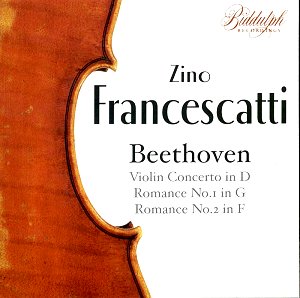AVAILABILITY
www.biddulphrecordings.com
For the second release
since its recent welcome relaunch Biddulph
has resurrected Francescatti’s earlier
1950 recording of the Beethoven and
coupled it with the two almost contemporaneous
Romances conducted by Jean Morel. In
the Concerto he was partnered by Eugene
Ormandy and the Philadelphia, a relatively
early mono LP and one generally eclipsed
by the subsequent stereo remake with
Bruno Walter and the Columbia Symphony
in 1962. This was last issued coupled
by Sony with the Sibelius Concerto.
Whether one admires
more the Walter or Ormandy, Francescatti’s
virtues remain consistent: elegance
and patrician ease of execution, a notable
sense of poise and command. Ormandy,
a former violinist whose solo discs
have been issued on Biddulph, moulds
the opening with individual touches
and Francescatti responds with crystalline
purity. Parts of the first movement
sound surprisingly slow and lyrical
with moments of very slightly rhetorical
phrasing – but a look at the timings
shows that actually they steer a perfectly
acceptable course between the volatile
speed of, say, Heifetz, Huberman and
Busch and the more measured generosity
of Menuhin, Stern and Suk – to take
six examples almost at random. The slow
movement is suffused in sweet lyricism,
with Francescatti varying the distribution
of vibrato and bow weight appositely,
his playing – supported well by Ormandy
– full of affectionate generosity. The
finale is light hearted and unaggressive,
Ormandy not unleashing big tuttis and
instead cushioning Francescatti with
precise sensitivity. Sleeve-note writer
and producer Eric Wen prefers this recording
to the later stereo one. Both show sovereign
instrumental and expressive control
if not ultimately absolute penetration
to the music’s core. The sweet geniality
sometimes limits ambiguous exploration
but no one could doubt the sophistication
of the musicianship. The Romances are
delectably spun.
The original recording
of the Concerto was rather muddy with
occasional muffled middle frequencies
but Francescatti’s tone emerges well
and unhindered and the transfer does
justice to it. As with the Szigeti release
no original recording details are given,
just dates, which I think is a mistake
but otherwise Francescatti’s many admirers
will want to acquaint themselves with
a recording that has rather slipped
the net over the years.
Jonathan Woolf
